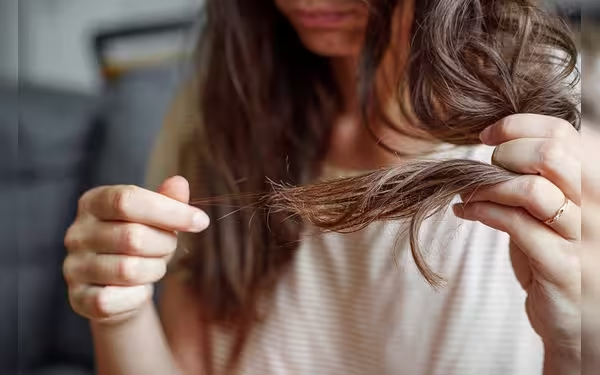Thursday, November 7, 2024 01:17 PM
PCOS Hair Loss: Causes, Symptoms, and Treatment Options
- PCOS causes hormonal imbalance leading to hair loss.
- Emotional impact of hair loss can be profound.
- Natural remedies and medical treatments available.
 Image Credits: tribune.com.pk
Image Credits: tribune.com.pkExplore the causes, symptoms, and treatment options for hair loss related to PCOS, including natural remedies and emotional support.
Polycystic Ovary Syndrome (PCOS) is a common hormonal disorder that affects many women worldwide. One of the lesser-known symptoms of PCOS is hair loss, which can be distressing for those who experience it. Understanding the relationship between PCOS and hair loss is crucial for managing this condition effectively. In this article, we will delve into the causes, symptoms, and treatment options for PCOS-related hair loss, as well as some home remedies that may help.
PCOS is characterized by an imbalance of hormones, particularly elevated levels of androgens, which are often referred to as 'male hormones.' These elevated androgen levels can lead to various symptoms, including irregular menstrual cycles, weight gain, and, notably, hair thinning or loss. This hair loss typically occurs on the scalp, leading to a condition known as androgenetic alopecia. It is important to note that while hair loss can be a significant concern, it is just one of many symptoms associated with PCOS.
Symptoms of hair loss related to PCOS can vary from person to person. Some may notice thinning hair, while others might experience more significant bald patches. This can be particularly challenging for women, as societal norms often place a high value on hair as a symbol of beauty. The emotional impact of hair loss can be profound, leading to feelings of self-consciousness and anxiety.
When it comes to treatment options, there are several avenues to explore. Medical treatments often include hormonal therapies, such as birth control pills, which can help regulate hormone levels and reduce hair loss. Additionally, medications like spironolactone may be prescribed to block the effects of androgens on hair follicles. For those seeking more immediate results, topical treatments such as minoxidil can stimulate hair growth and are available over the counter.
In addition to medical treatments, many individuals find success with natural remedies. Maintaining a balanced diet rich in vitamins and minerals can support overall hair health. Foods high in omega-3 fatty acids, such as fish and flaxseeds, as well as those rich in antioxidants, like berries and leafy greens, can be beneficial. Regular exercise can also help manage weight and improve insulin sensitivity, which may alleviate some symptoms of PCOS.
Stress management is another critical component in addressing hair loss related to PCOS. Practices such as yoga, meditation, and deep-breathing exercises can help reduce stress levels, which in turn may positively impact hair health.
While PCOS-related hair loss can be a challenging symptom to navigate, understanding its causes and exploring various treatment options can empower those affected. It is essential to consult with a healthcare professional to develop a personalized plan that addresses both the physical and emotional aspects of this condition. Remember, you are not alone in this journey, and with the right support and information, managing PCOS and its symptoms is entirely possible.













